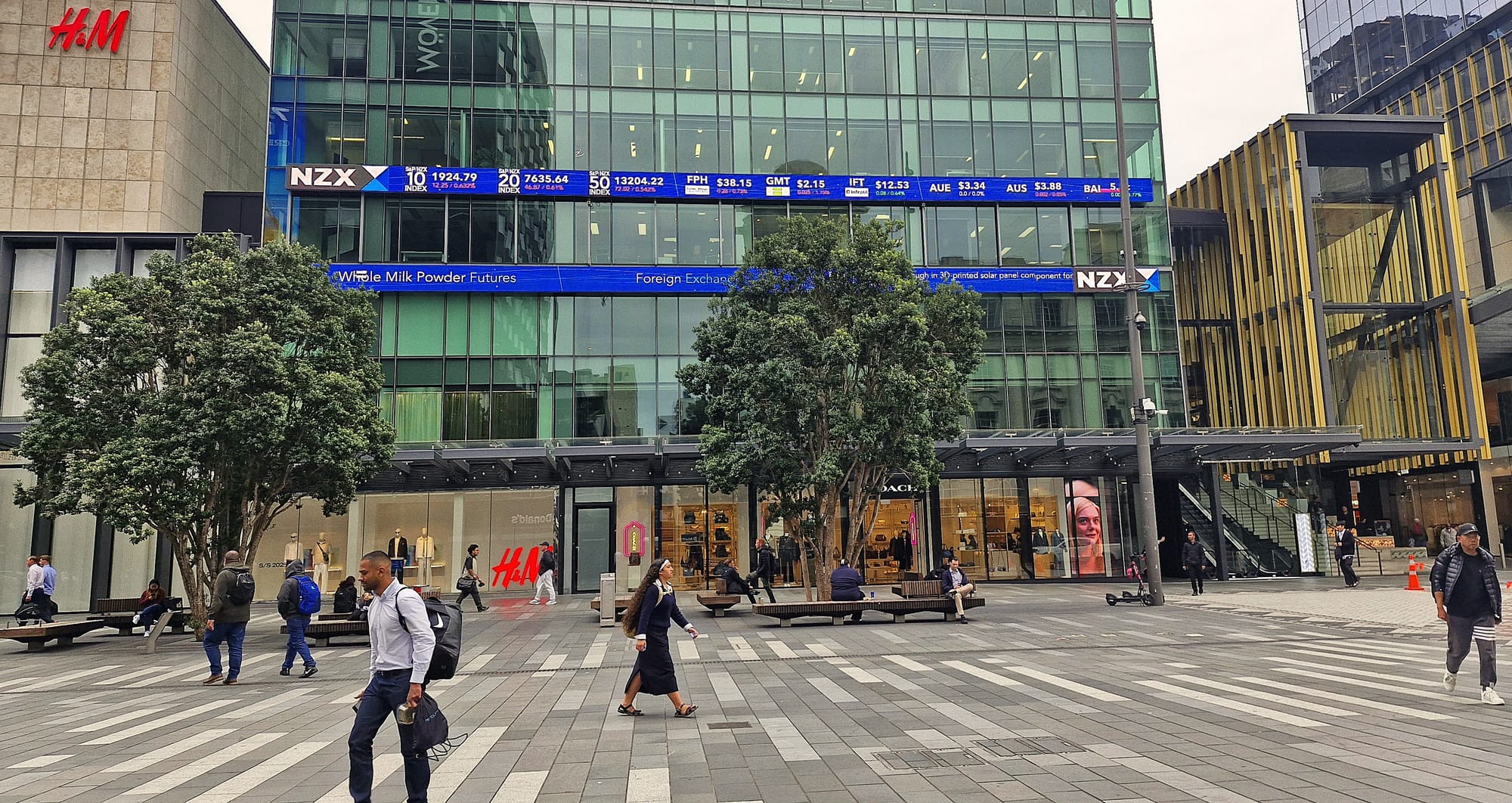NZX50 joins Australia lower as Oracle’s AI frenzy skips antipodes
Spark’s new strategy didn’t get the warmest of receptions.

New Zealand’s S&P/NZX 50 index joined Australia on the red side of the ledger, with the antipodean nations missing out on a tech rally across Asia after Oracle soared on growing revenue prospects from artificial intelligence.
Spark New Zealand declined as the telco unveiled its strategy for the rest of the decade, with modest earnings growth built in over the next five years and chair Justine Smyth planning to stay for one more year as part of the transition for her yet-to-be-named successor.
Meanwhile, Scott Technology surged near an eight-month high as the automation systems maker outlined plans to almost double revenue by the end of the decade, while noting a recovery in its second-half earnings.
And Reserve Bank governor Christian Hawkesby largely stuck to the script in today’s speech at the Financial Services Council, saying the core outlook is still for the official cash rate to fall to 2.5% by the end of the year.
Outliers
The NZX50 dropped 47.09 points, or 0.4%, to 13,229.15, with 30 companies declining, 14 gaining, and six unchanged. Turnover across the main board was $118.6 million, with Fisher & Paykel Healthcare accounting for $16.6 million as it slipped 0.6% to $38.20.
Australia’s S&P/ASX 200 index declined 0.4% in late trading, with the antipodean markets among the few not to enjoy a tech-fuelled rally after Oracle soared on Wall Street overnight as the cloud computing firm talked up the outlook for revenue from the AI boom.
That comes ahead of US consumer inflation figures, which are seen as the final, and increasingly high, hurdle to deter the Federal Reserve from cutting the federal funds rate next week.
“We had some weak jobs data recently and that’s pointing more in the rate cut camp,” said Grant Davies, an investment adviser at Hamilton Hindin Greene. “We’ll obviously be waiting for that inflation data and whether it gives the Fed another reason to cut rates."
Declines were widespread on the local bourse with blue-chip stocks weighing on the NZX50. Meridian Energy fell 1% to $5.72 after reporting a decline in national hydro storage levels with the South Island losing water faster than the North, while Contact Energy declined 1.4% to $9.22. Port of Tauranga slipped 2.1% to $7.49.
Spark New Zealand slipped 2.4% to $2.44 after the country’s biggest telecommunications firm outlined its five-year plan to generate single-digit earnings growth, with a greater focus on its core businesses to deliver annuity-style returns for its investors.
Meanwhile, chair Justine Smyth said she plans to stand for re-election at this year’s annual meeting and keep her seat for another 12 months as part of planning for her successor.
KMD Brands led the benchmark index lower, falling 5.9% to 24 cents, while Briscoe Group declined 2.5% to $5.50.
Briscoe chief Rod Duke observed the retail sector is facing one of its toughest environments in his career following his firm’s first-half result on Wednesday, with Jarden analysts downgrading their rating on the stock to ‘neutral’ from ‘outperform’ and Forsyth Barr and Macquarie analysts trimming their price target.
Hallenstein Glasson Holdings rose 0.6%$ to $9.05, while outside the benchmark index, Warehouse Group gained 0.6% to 79 cents and Michael Hill International fell 1.2% to 40 cents.
Among NZX50 companies shedding rights to dividends today, Freightways slipped 0.6%, or 7 cents, to $12.13 after giving up rights to its 21 cents per share return, while Air New Zealand declined 3.3%, or 2 cents, to 58.5 cents after going ex-dividend on a 1.25 cent distribution.
A rare green hue
Tourism Holdings posted the biggest gain on the NZX50, rising 2.8% to $2.60, while Stride Property Group gained 2.7% to $1.32 on an unusually large volume of 2.6 million shares in the day’s heaviest trading. Turners Automotive Group rose 1.7% to $7.01.
Outside the benchmark, Scott Technology surged 15% to $2.25, its highest level since late January, after the automation systems maker said it expects to report record annual earnings as a strong second half focused on high-margin business offset earlier declines in revenue. The company also mapped out a plan to almost double annual revenue by 2030.
NZME decreased 0.4%, or 5 cents, to $1.12 after shedding rights to a 3 cents per share dividend, and NZ Rural Land Co fell 3%, or 3 cents, to 98 cents as it gave up rights to a 2.16 cents per share return.
The kiwi dollar traded at 59.37 US cents at 5pm in Auckland from 59.47 cents yesterday after Reserve Bank governor Christian Hawkesby reiterated the central bank’s projection for the official cash rate to fall to 2.5% by the end of the year, with the economy stalling through the middle of the year and providing enough slack for looser monetary conditions.
And fund manager Booster has hired former Kiwi Wealth exec Simon O’Grady as its new chief investment officer, starting from mid-September.
Reporting by Paul McBeth. Image from Curious News.







